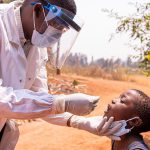 People in the United States are growing concerned about the spread of Zika virus. Zika cannot be contracted through casual contact, or through air, food, or water. Humans can be infected with Zika virus through bites from an infected Aedes species of mosquitos or through unprotected sexual contact with an infected individual. No infected mosquitoes have been found in the continental United States yet and Pennsylvania isn’t home to the Aedes species.
People in the United States are growing concerned about the spread of Zika virus. Zika cannot be contracted through casual contact, or through air, food, or water. Humans can be infected with Zika virus through bites from an infected Aedes species of mosquitos or through unprotected sexual contact with an infected individual. No infected mosquitoes have been found in the continental United States yet and Pennsylvania isn’t home to the Aedes species.
The most common symptoms of Zika are fever, rash and conjunctivitis (red eyes). The illness is usually mild and symptoms typically last for several days to a week. There have been reports of microcephaly, a serious neurological birth defect in which a baby’s head is significantly smaller than normal, born to mothers who were infected with Zika virus while pregnant.
The virus has spread to countries in South America and the Caribbean, leading health officials to warn pregnant women against traveling to those areas. If travel cannot be avoided, pregnant women should talk to their doctors and follow strict precautions to avoid mosquito bites. Any woman of child bearing age who is planning a pregnancy should consult with her doctor before travel to these areas and follow strategies to prevent mosquito bites. Updated guidelines from the CDC advise that pregnant women should avoid sexual contact or use condom protection with an individual who may be infected, or is at risk for infection based on his travel history, in order to prevent transmission of the Zika virus.
To date, no locally transmitted Zika cases have been reported in the continental United States and there is little risk of acquiring Zika in Pennsylvania at this time. UPMC is following all guidelines and recommendations from the CDC, the Pennsylvania Department of Health and the Allegheny County Health Department. Pregnant women who have a history of travel to affected areas, or have a sexual partner who has traveled to a high-risk area, should contact their personal obstetrician or midwives for advice and testing.
For more information on Zika affected areas, prevention and the travel alert for people traveling to regions and certain countries where Zika virus transmission is ongoing, visit: http://www.cdc.gov/zika/







